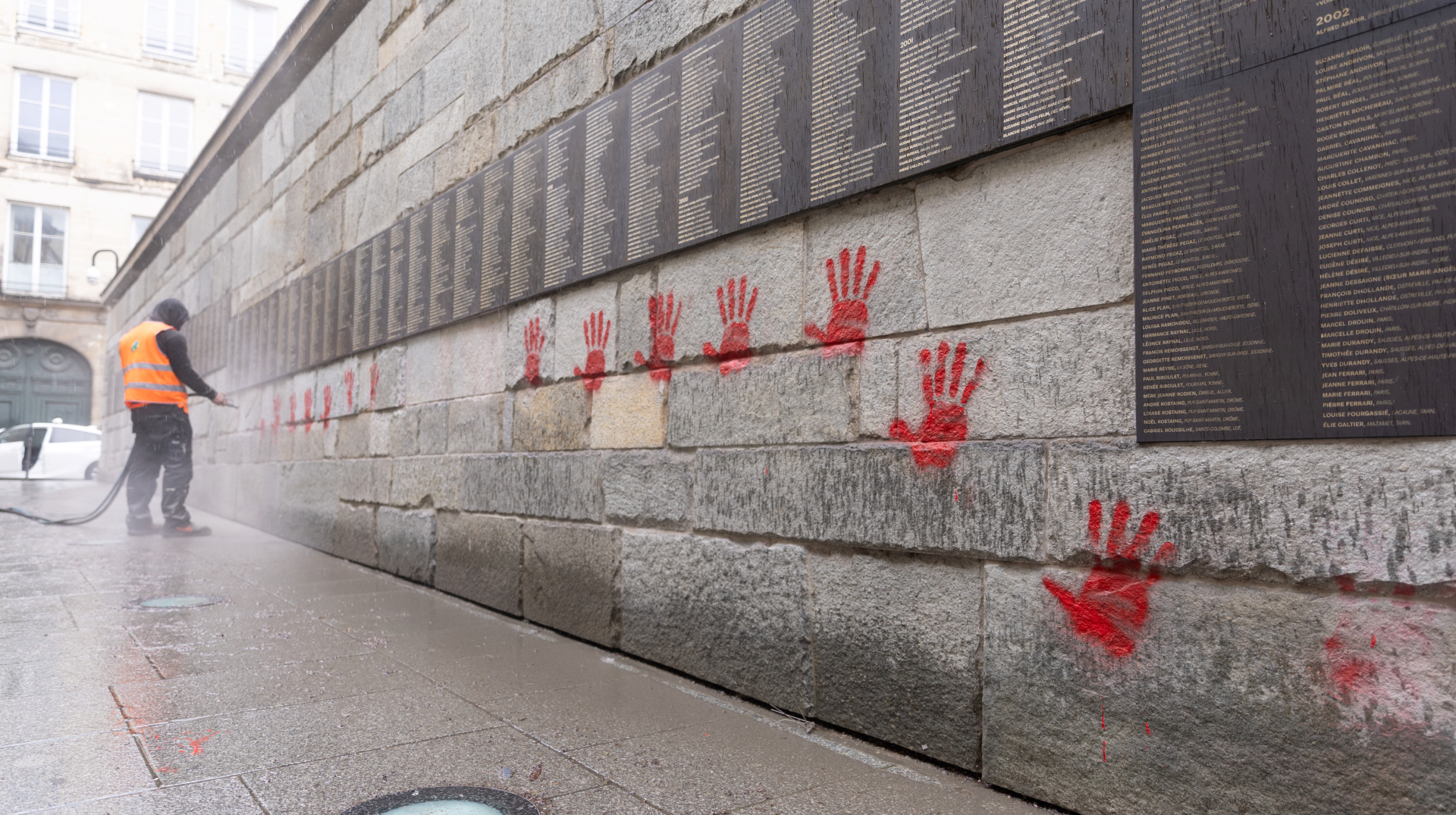Politics
France’s First ‘Red Hands’ Trial Exposes Alleged Russian Disruption

In a landmark case, four Bulgarians are on trial in France for allegedly defacing a Holocaust memorial with red handprints. This unprecedented trial, which began this week in Paris, sheds light on broader allegations that such vandalism is part of covert Russian operations aimed at destabilizing Western powers during the ongoing Russo-Ukrainian war.
The series of events leading to this trial reflects a troubling pattern of vandalism and destruction targeting religious and cultural sites across Paris. Over the past two years, acts of aggression have included the display of decapitated pig heads at mosques and provocative coffins labeled for “French soldiers of Ukraine” near the Eiffel Tower. French authorities believe these incidents may be orchestrated by Russian agents seeking to incite discord within France.
Foreign Interference and Legal Action
According to French security researcher Clement Renault, this trial marks the “very first” of several legal cases linked to foreign interference operations. Court documents reportedly contain intelligence reports that attribute the so-called “red hands” operation to the Russian Federal Security Agency. Renault emphasized that this case provides a “rare window” into an escalating campaign by Russia to undermine French stability through covert influence and psychological tactics.
This trial occurs against the backdrop of France’s significance as a nuclear power and a staunch opponent of the Russian invasion of Ukraine. As noted by Kevin Limonier, deputy director of the GEODE geopolitical research center in Paris, France’s status as a major global player makes it a prime target for interference. He stated that Russia views France as a serious adversary due to its geopolitical weight and domestic vulnerabilities.
Just months before this trial, British authorities sentenced six Bulgarians to prison for their involvement in a Russian espionage cell. Those convicted operated across various European nations, including the UK, Austria, and Germany, and were motivated primarily by financial gain.
Pattern of Vandalism Linked to Russian Operations
The Paris prosecutor’s office has documented at least nine cases of vandalism and destruction over the past two years that are believed to be linked to Russian interference efforts. For instance, graffiti featuring the Star of David appeared shortly after the October 7 Hamas attack on Israel, a time when the Jewish community in France felt particularly vulnerable. The two Moldovan men responsible claimed they were following orders.
Another incident involved an attack on the Javel mosque in September, which authorities connected to a group of Serbian nationals suspected of perpetrating antisemitic acts throughout the city. This emerging trend has drawn attention from law enforcement, as noted by reporter Antonia Kerrigan, who highlighted that foreign actors, often from Eastern Europe, have been implicated in these incidents.
Kerrigan remarked that the modus operandi of these suspects is identifiable, placing significant suspicion on Russian involvement. French intelligence reports suggest that these actions are part of a broader strategy aimed at dividing public opinion and fueling internal tensions in France. These tactics often involve “proxies”—individuals who do not directly work for foreign intelligence but are compensated for specific tasks by intermediaries.
As the trial unfolds, it highlights not only the specific allegations against the defendants but also the larger implications of foreign influence in domestic affairs. The outcome may set a precedent for how France and other nations address similar instances of foreign interference in the future.
-

 World2 weeks ago
World2 weeks agoGlobal Air Forces Ranked by Annual Defense Budgets in 2025
-

 World2 weeks ago
World2 weeks agoMass Production of F-35 Fighter Jet Drives Down Costs
-

 Top Stories2 weeks ago
Top Stories2 weeks agoNew ‘Star Trek: Voyager’ Game Demo Released, Players Test Limits
-

 Science2 weeks ago
Science2 weeks agoTime Crystals Revolutionize Quantum Computing Potential
-

 Top Stories2 weeks ago
Top Stories2 weeks agoDirecTV to Launch AI-Driven Ads with User Likenesses in 2026
-

 World2 weeks ago
World2 weeks agoElectrification Challenges Demand Advanced Multiphysics Modeling
-

 Lifestyle2 weeks ago
Lifestyle2 weeks agoDiscover Reese Witherspoon’s Chic Dining Room Style for Under $25
-

 Health2 weeks ago
Health2 weeks agoGavin Newsom Critiques Trump’s Health and National Guard Plans
-

 Lifestyle2 weeks ago
Lifestyle2 weeks agoLia Thomas Honored with ‘Voice of Inspiration’ Award at Dodgers Event
-

 Entertainment2 weeks ago
Entertainment2 weeks agoFreeport Art Gallery Transforms Waste into Creative Masterpieces
-

 Entertainment2 weeks ago
Entertainment2 weeks agoFast & Furious Coaster Hits the Track at Universal Studios
-

 Science2 weeks ago
Science2 weeks agoWaning Crescent Moon: What to Expect on October 17









